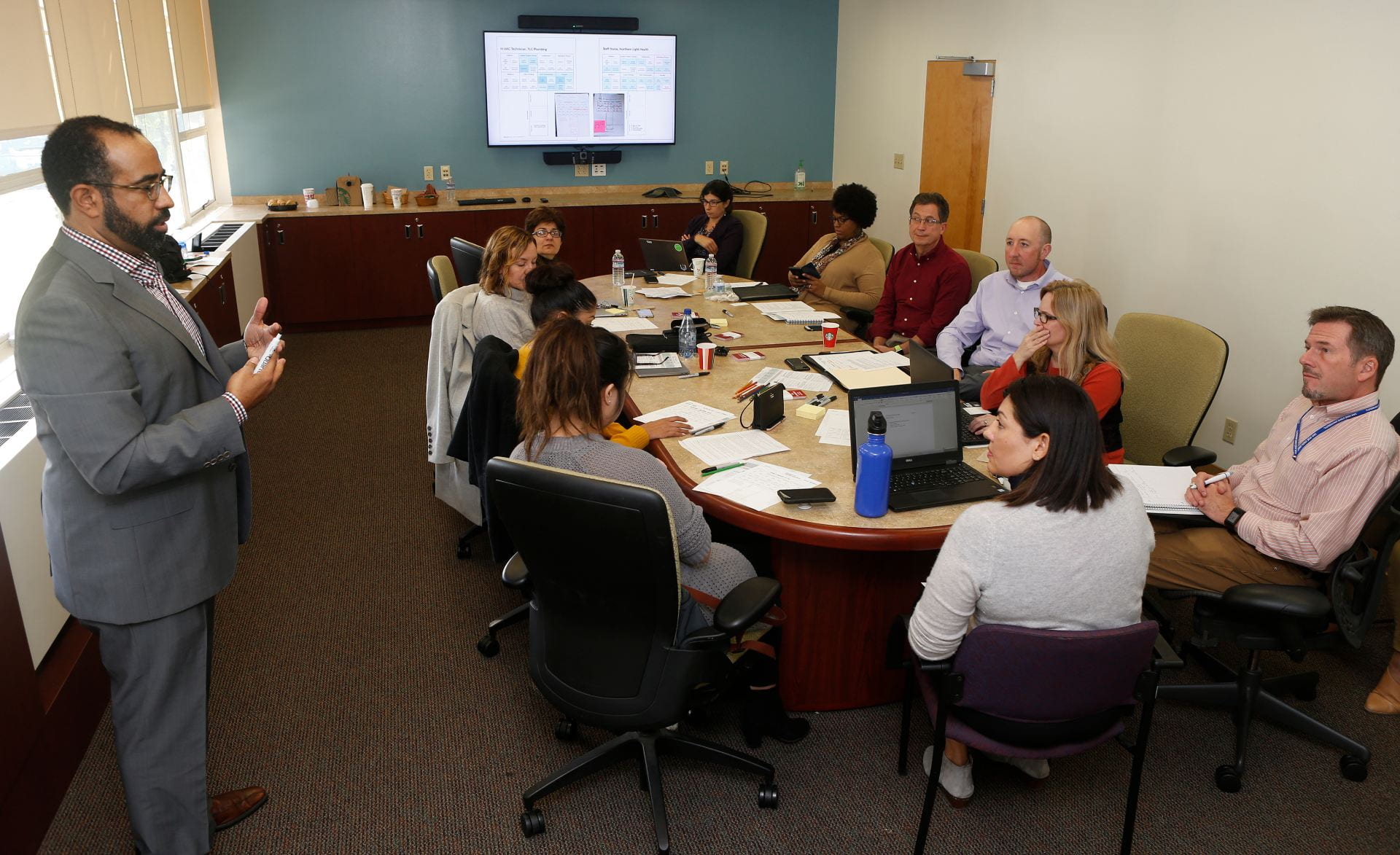
Don Fraser, Jr., left, Education Designer, Director of Micro-Credentialing, of Education Design Lab, gave a presentation to SJSU faculty, and members of Cisco Systems and Enterprise Holdings on the campus of San Jose State University on Monday, Dec. 10, 2018. San Jose State University in partnership with Education Design Labs, Cisco and Enterprise Holdings during a focus group in fall 2018. ( Josie Lepe/San Jose State University )
San Jose State University will continue its 21st Century Skills Badge pilot program this fall in partnership with Education Design Labs. Education Design Labs is a nonprofit focused on designing, implementing and scaling new learning models for higher education and the future of work. The nonprofit received a grant from Lumina Foundation to expand its micro-credential program in three U.S regions through partnerships with universities and employers.
The Education Design Lab first connected with SJSU’s Career Center leaders and educators in fall 2018. Through focus groups with faculty, students and employers, they begin designing a digital skills badge program that would benefit students and potential employers. The pilot program launched in spring 2019, with two partner employers who offered to virtually review resumes of potential candidates, Cisco Systems and Enterprise Holdings.
“New, AI-driven recruiting methods enable employers to assess fit for roles based on disaggregated bundles of skills rather than college majors alone,” said Catherine Voss Plaxton, SJSU Career Center director, in advance of the pilot roll-out. “In other words, the sociology student may be a perfect fit for a user-experience position if they can provide evidence they have right mix of skills. The process of earning a 21st Century Skills Badge can be a strong way to shift student understanding of those skills from the abstract to the specific behaviors valued in workplaces.”
Meg Virick, interim associate dean of Undergraduate Programs in the Lucas College and Graduate School of Business, attended a focus group last fall with other colleagues to provide input into designing the pilot.
“Preparing students for the workforce has always been a high priority for us, and the focus group held Dec. 10 exemplified that effort – bringing together representatives from industry, academia and the non-profit world around the table,” she said.
SJSU started the pilot with three badge options–oral communication, collaboration and creative problem solving. During the pilot semester, 54 students registered and participated in the program. The grant will allow SJSU to expand the pilot program over the next two years with a goal of expanding participation to 1,000 students with five to seven employer partners.

Senior students participate in the digital badges workshop on the campus of San Jose State University on Monday, Dec. 10, 2018. San Jose State University in partnership with Education Design Labs, Cisco and Enterprise Holdings. Program testing how digital skills badges in combination with an excellent academic experience can help graduates become more employable.( Josie Lepe/San Jose State University )
“Today’s employers are desperate for applicants with the right combination of technical and mobility skills. In most cases, it’s not that employers don’t have enough applicants. More often, they lack a clear signal of hard-to-measure skills that lead to long-term employee retention and success,” said Kathleen deLaski, founder and president of the Lab. “This work is about creating a two-way dialogue that empowers students to display these hard-earned skills in a format that’s easily recognizable to employers.”
Holly Zanville, strategy director for the future of learning & work at Lumina Foundation sees the promise of this approach: “By working with employers and institutions together, we’re gaining valuable new insights into how micro-credentials can boost the hiring prospects of underserved learners.”
The new initiative, called BadgedToHire, builds on the Lab’s pioneering Tee Up the Skills campaign, which pairs employers with colleges and universities to design micro-credentials that assess and validate 21st century skills aligned with local hiring demand. Over the next two years, the Lab will work with three institutions and their employer partners to study the awareness and acceptance of digital credentials as a signal for 21st century skills and improve hiring outcomes among historically underrepresented learners who receive the badges.
“The crucial skills that matter in the long run for our employees — resilience, critical-thinking, problem-solving — are ironically the most difficult for us to detect because they never show up in a resume or a transcript,” said Casey Porter, Talent Acquisition Manager for Enterprise Holdings, which participated in the first phase of Tee Up the Skills as one of San Jose State University’s employer partners. “Using badging and credentialing to certify these critical skills immediately communicates to hiring managers when an applicant has gone above and beyond to build skills we need and value.”
